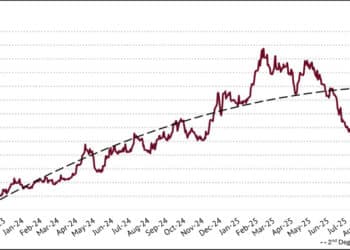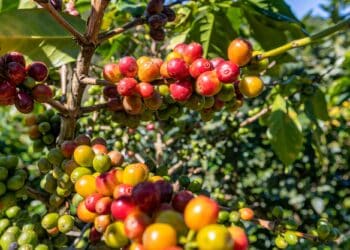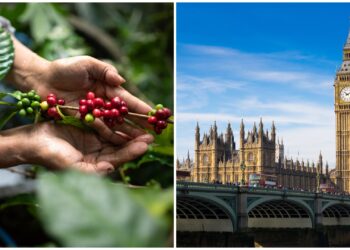Cafe de Colombia has been working to improving connectivity and access to telecommunications technology as a core¬†focus to improve the lives of¬†farmers at Origin. ','none',' Discussions on sustainability don’t usually congure up images of data chips, ID cards and computer centres. Speak with the Colombian Coffee Growers Federation (FNC), however, and that’s exactly what you’ll get. Connectivity has been one of the four pillars of the organisation’s “Sustainability That Matters” program. FNC represents over 500,000 small coffee growers within 20 departments of Colombia. Since launching its sustainability platform, collecting and sharing information with farmers has been a primary focus of its program to improve its members’ quality of life. “When we do presentations, people don’t usually get why connectivity is in there with sustainability,” says Marcela Jaramillo, Marketing and Advertising Coordinator for the FNC. “It’s important for coffee growers to be connected to the world so that they can access modern services.” At a time when globalisation brings both challenges and opportunities for coffee growers, Jaramillo notes that introducing connectivity into their sustainability platform has been a vital component of ensuring coffee growers are receiving the benefits offered by the modern world. Keeping track of 500,000 farmers while also feeding them information, is no easy feat, and as such SICA was born. SICA is a coffee grower information system that tracks location and alphanumeric information on coffee growers and geo references their farms and coffee lots. The creation of the site followed the urgent need of the FNC’s Extension Service, made up of technicians and agronomists who transfer technological knowledge to coffee growers. “Our basic objective is to improve the quality of life of Colombian coffee growers by developing practices that allow them to produce excellent coffee in a sustainable way,” notes Jaramillo, adding that the FNC also encourages farmers to participate in social, productive, infrastructure and environmental projects that encourage their wellbeing. To keep the information on the different programs up-to-date, FNC developed the SICA/AFIC software that records real-time information on education and application tasks. Education tasks are educational activities led by the 1500 strong Extension Service, involving coffee growers and their families, looking to improve productive practices by transferring technical knowledge that will ultimately improve the quality of their life. Application tasks consist of activities performed by coffee growers to either modify the internal conformation of coffee farms, or assure the sustenance and production of coffee plantations. For instance, some application tasks could include registering new plantlets, seeding renovation and change on coffee varieties. Jaramillo notes that while collection of this information started in 1997, the SICA database has operated since 2008 on a web platform, so that coffee growers – using satellite pictures – can access their farm and look at all their information on line. At the FNC level, the information gathered has been vital in consolidating reports that detail statistics on the number of coffee growers, number of farms and number of hectares depending on variety, age, density, luminosity and dimness. These results then allow the development of short, medium and long term goals that contribute to the Colombian coffee industry’s competitiveness and sustainability. And, while having this information on hand naturally helps the FNC in coordinating its activities, Jaramillo emphasises the primary benefits are to coffee growers. In being able to access basic information and socioeconomic data on coffee producers, coffee growers are able to consult the characteristics of coffee lots and crops and have permanent communication with their technicians who can assist them. This of course begs the question: how are these farmers supposed to access this information? Internet access in Colombia in isolated communities is scattered at the best of times. A big step of the program has been the construction of connectivity centres, essentially providing central internet access hubs. The initial phase, launched in January this year, saw Piendamo, Cauca as the first of 60 coffee communities that would see the installation of modern connectivity centres throughout the coffee regions of Colombia.
In providing specialised training and a greater range of information regarding the industry, the construction of the connectivity centres will benefit over 85,000 coffee growers in its first phase this year. “Today’s globalised world requires us to narrow the gap between rural and urban areas by the incorporation of scientific knowledge and the use of cutting edge technologies,” notes Luis G. Munoz, CEO of the FNC. “Balance between technology and tradition has been one of the major achievements of the federation.” This first phase was financed by an alliance between the Inter-American Development Bank (IDB) and the FNS. The final goal of the FNC will be to see a connectivity centre in every one of the 364 Municipal Committees of Coffee Growers. From this group level access, the extension of technology in the connectivity program extends to the individual. Another goal of the technological advances has been the introduction of the Intelligent Coffee Grower ID card. Using an intelligent chip and magnetic band, the growers use these cards for identification, and also to receive payment for coffee sales, resources for specific programs and access to other financial services. For example, resources from the government to support farmers that have been affected by the heavy rains can be quickly deposited in the ID cards without intermediaries. “It can be hard for many of these growers to access banks, as there are no branches in many towns, and you really want to avoid having coffee growers walk around with cash,” says Jaramillo. The cards also allow them to vote electronically in FNC elections. With notably limited access to banking systems in such remote regions, a Mobile Bank is also being piloted for the first time in Colombia. The project will benefit more than 300,000 coffee growers throughout the country by allowing them to make electronic transactions with the money deposited in their ID card. They can also pay using their cellular phones. In the same manner, they will be able to consult the price of coffee and check their balance without moving from their location. This last project is being developed with the Telefonica Movistar, the FNC and Banco de Bogota, with the support of the Inter-American Development Bank and departments of Santander, Caldas and Risaralda.
Coffee prices moving “sideways” – ICO October report
The latest International Coffee Organization market report has indicated coffee prices remained relatively stable over the month of October, with...





